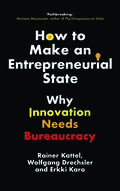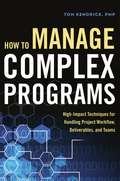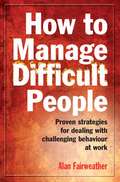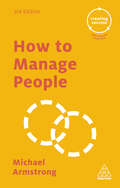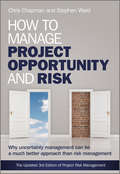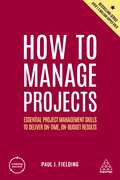- Table View
- List View
How to Make a Living Trading Foreign Exchange
by Courtney SmithSolid Forex strategies for capturing profits in today's volatile marketsHow to Make a Living Trading Foreign Exchange puts the world of Forex at your fingertips. Author Courtney Smith begins with an introduction to the Forex market-what it is and how it works. He then delves into six moneymaking techniques for trading Forex, including his unique Rejection Rule that doubles the profit of basic channel breakout systems. In addition to two specific methods for exiting positions at critical levels, Smith also discusses powerful risk management techniques and successful trading psychology strategies that will keep you one step ahead of the game.Reveals the secrets of the Forex market and how to create a lifetime of income trading itOffers advice on maximizing profits during the volatile swings that have increasingly become the normOther titles by Smith: Option Strategies, Third Edition, Seasonal Charts For Futures Traders, Commodity Spreads, and Profits Through Seasonal TradingMake more from today's Forex market with How to Make a Living Trading Foreign Exchange.
How to Make a Living as a Professional Magician: Business First, Sleight-of-Hand Later
by Matt PattersonYou may be able to pull off an impressive card trick, but can you recruit new clients and tailor your show to different occasions? In the only guide of its kind, professional magician Magnus shows you the ins and outs of managing your career in magic. His tried-and-true methods will convert you — presto, change-o — into a successful professional.Magnus will help you with developing the persistence and conviction you'll need for a career in close-up magic, making your pitch to potential employers, and promoting and marketing your act. He'll advise you on the tricks that will provide you with the most mileage — the time-tested audience-pleasers that can be performed in a wide variety of situations — and the best ways to practice them to ensure a smooth execution. His advice on cultivating skills that contribute to a successful performance, getting along with coworkers, and handling hecklers will save you untold aggravation and smooth the path toward a magical career.
How to Make a Living as a Writer
by James Scott BellIt's the best time on Earth to be a writer. More writers are making money today than at any other time in history. For centuries few have been able to support themselves from the quill or the keyboard alone. Not anymore. With the rise of ebooks and indie publishing there are now more opportunities than ever for writers to generate substantial income from their work. And there is still a traditional publishing industry that needs new talent to keep growing. In How to Make a Living as a Writer, you'll learn the secrets of writing for profit and increasing your chances of making a living wage from your work. Here are some of the subjects covered: - The 7 Secrets of Writing Success - The 8 Essentials of Your Writing Business - How to Reach Your Goals - Keys to a Winning System - How to Stay Relentless - Unlocking Your Creativity - How to Write More, Faster - Comparing Traditional and Self-Publishing - How to Go Traditional - How to Go Indie - How to Form Multiple Streams of Writing Income - How to Write a Novel in a Month - How to Choose Non-Fiction Subjects - How to Keep a Positive Mental Attitude - Resources for Further Study And much more, all to help you write what you love and earn what you’re worth. James Scott Bell has made a living as a writer for nearly two decades, and shares with you everything he knows about the best practices for turning your writing dream into a reality.
How to Make a Million Before Lunch
by Rachel BridgeFed up with working for someone else? Want to start your own business but don't want to wait years to reap the rewards? Take every shortcut you can ... and get there fast.As Enterprise Editor of The Sunday Times, Rachel Bridge has met hundreds of the world's most successful entrepreneurs. Now she shares their expertise to show you the top 20 shortcuts to creating a booming business - and the energy-sapping, time-wasting traps to avoid along the way - so you too can make a million - asap.
How to Make an Entrepreneurial State: Why Innovation Needs Bureaucracy
by Rainer Kattel Wolfgang Drechsler Erkki KaroA ground-breaking account which shows how the public sector must adapt, but also persevere, in order to advance technology and innovation From self-driving cars to smart grids, governments are experimenting with new technologies to significantly change the way we live. Innovation has become vitally important to states across the world. Rainer Kattel, Wolfgang Drechsler and Erkki Karo explore how public bodies pursue innovation, looking at how new policies are designed and implemented. Spanning Europe, the USA and Asia, the authors show how different institutions finance new technologies and share cutting-edge information. They argue for the importance of &‘agile stability&’, demonstrating that in order to successfully innovate, state organizations have to move nimbly like start-ups and yet ensure stability at the same time. And that, particularly in the light of the Covid-19 pandemic, governments need both long-term policy and dynamic capabilities to handle crises. This vital account explores the complex and often contradictory positions of innovating public bodies—and shows how they can overcome financial and political resistance to change for the good of us all.
How to Make it Happen: Turning Failure into Success
by Maria HatzistefanisSuccess is not final and failure is not fatal. Having spent 20 years building her own company (described by the press as "an overnight success"), Maria Hatzistefanis acknowledges how hard it is to keep going and find your motivation, especially in the face of self-doubt, rejection and unexpected setbacks. This book spells out how to motivate yourself and harness your drive and energy to make things happen. With clear guidance, tips and celebrity stories throughout, Maria sums up her business secrets with three golden rules: set your goals; plot your trajectory; make it happen! This book will help anyone looking to grow their business and enable readers everywhere to find their own "Make It Happen" mindset. Everyone can learn from this book, no matter where you are in your career.
How to Make it Happen: Turning Failure into Success
by Maria HatzistefanisSuccess is not final and failure is not fatal.Maria Hatzistefanis should know. Having spent 20 years building her own company (described by the press as 'an overnight success'), she acknowledges how hard it is to keep going and find your motivation, especially in the face of self-doubt, rejection and unexpected setbacks.This punchy, easy to digest book spells out how to motivate yourself and harness your drive and energy to make things happen. With clear guidance, tips and celebrity stories throughout, Maria sums up her business secrets with three golden rules: set your goals; plot your trajectory; make it happen! This book will help anyone looking to grow their business and enable readers everywhere to find their own 'Make It Happen' mindset. Everyone can learn from this book, no matter where you are in your career.
How to Make the Barriers Fall: Heathrow Tunnel and Restaurants Without Food--Opening Your Mind to Intersectional Ideas
by Frans JohanssonBreaking down our associative barriers is the first challenge we face in our search for the intersection of fields, disciplines, or cultures where extraordinary new ideas emerge. This chapter shows you how to do it.
How to Make the World Add Up: Ten Rules for Thinking Differently About Numbers
by Tim HarfordThe Sunday Times Top Ten bestseller'Tim Harford could well be Britain's Malcolm Gladwell'Alex Bellos, author of Alex's Adventures in Numberland'If you aren't in love with stats before reading this book, you will be by the time you're done. Powerful, persuasive, and in these truth-defying times, indispensable'Caroline Criado Perez, author of Invisible Women In How to Make the World Add Up, Tim Harford draws on his experience as both an economist and presenter of the BBC's radio show 'More or Less' to take us deep into the world of disinformation and obfuscation, bad research and misplaced motivation to find those priceless jewels of data and analysis that make communicating with numbers so rewarding. Through vivid storytelling he reveals how we can evaluate the claims that surround us with confidence, curiosity and a healthy level of scepticism. It is a must-read for anyone who cares about understanding the world around them.'Tim Harford is our most likeable champion of reason and rigour . . . clear, clever and always highly readable'The Times, Books of the Year'Fascinating and enjoyable'Bill Bryson'Now more than ever we need a book like this'Stephen Fry'Wise, humane and, above all, illuminating. Nobody is better on statistics and numbers - and how to make sense of them'Matthew Syed'One of the most wonderful collections of stories that I have read in a long time . . . fascinating.'Steven Levitt, co-author of Freakonomics'Wise and useful . . . such a delight' Financial Times'What should we do when someone makes a claim that they say is based on data? This wise book, distilled from years of experience, gives us the ten commandments, from first examining our feelings, to finally having the humility to admit we may be wrong. Priceless'Professor Sir David Spiegelhalter
How to Make the World Add Up: Ten Rules for Thinking Differently About Numbers
by Tim HarfordThe Sunday Times Bestseller'Tim Harford is one of my favourite writers in the world. His storytelling is gripping but never overdone, his intellectual honesty is rare and inspiring, and his ability to make complex things simple - but not simplistic - is exceptional. How to Make the World Add Up is another one of his gems. If you're looking for an addictive pageturner that will make you smarter, this is your book' Rutger Bregman, author of Humankind'Tim Harford could well be Britain's Malcolm Gladwell'Alex Bellos, author of Alex's Adventures in Numberland'If you aren't in love with stats before reading this book, you will be by the time you're done. Powerful, persuasive, and in these truth-defying times, indispensable'Caroline Criado Perez, author of Invisible Women In How to Make the World Add Up, Tim Harford draws on his experience as both an economist and presenter of the BBC's radio show 'More or Less' to take us deep into the world of disinformation and obfuscation, bad research and misplaced motivation to find those priceless jewels of data and analysis that make communicating with numbers so rewarding. Through vivid storytelling he reveals how we can evaluate the claims that surround us with confidence, curiosity and a healthy level of scepticism. It is a must-read for anyone who cares about understanding the world around them.'Tim Harford is our most likeable champion of reason and rigour . . . clear, clever and always highly readable'The Times, Books of the Year 'Fascinating and enjoyable'Bill Bryson'Now more than ever we need a book like this'Stephen Fry'Wise, humane and, above all, illuminating. Nobody is better on statistics and numbers - and how to make sense of them'Matthew Syed'One of the most wonderful collections of stories that I have read in a long time . . . fascinating.'Steven Levitt, co-author of Freakonomics'Wise and useful . . . such a delight' Financial Times'What should we do when someone makes a claim that they say is based on data? This wise book, distilled from years of experience, gives us the ten commandments, from first examining our feelings, to finally having the humility to admit we may be wrong. Priceless'Professor Sir David Spiegelhalter
How to Manage Complex Programs: High-Impact Techniques for Handling Project Workflow, Deliverables, and Teams
by Tom KendrickProgram manager--it's one of the most challenging jobs you can have. Overseeing and coordinating multiple project teams and thousands of activities may seem a Herculean task, but it's easier with the right tools in hand.Successful program management begins with a good command of project management processes, but these are never sufficient. Once a program exceeds a certain scale, project processes become unwieldy. To see a program successfully through to completion, you must break the work down into simpler, smaller pieces and organize it into interdependent tasks.Complete with diagrams, graphs, and real-life examples, How to Manage Complex Programs explains the ins and outs of program management and provides concrete and effective techniques for structuring deliverables, workflow, and staffing. You'll learn to:Decompose complex deliverables into manageable chunksDevelop coherent plans for component projectsHandle cross-project dependenciesOrganize program staff and project leaders into a high-performing teamAnd moreYes, program management is challenging. But with these proven strategies, it can also be highly rewarding--for you and for your organization.
How to Manage Conflict in the Organization, Second Edition
by Gregg Lee Carter Joseph F. ByrnesGain control of tough conflict situations and transform them into a productive force in your organization. How to Manage Conflict in the Organization, Second Edition, equips you with the strategies, tactics and insights you need to gain control of tough conflict situations. You´ll discover how to spot potential interpersonal conflicts—and defuse them before they flare up. You´ll understand how, when, where and why to apply the five favored conflict-resolution approaches, and you´ll develop the insight and intuition you need to make them work. This book will give you the skills to transform conflict into a positive, productive force by applying the proven techniques of principled negotiation. You will learn how to: • Transform conflict into a positive, productive force • Respond to on-the-job conflicts quickly and effectively • Resolve conflicts positively using proven principled negotiation techniques. • Understand the differences between structural (organizational) and interpersonal conflict • Separate people from issues and focus on interests, not positions • Get beyond immediate tensions and disagreements to the root causes of any interpersonal conflict • Apply five surefire conflict-resolution approaches: avoiding, accommodating, compromising, forcing, and collaborating • Adopt best practices for implementing alternative dispute resolution techniques • Develop strategies for dealing with conflict resolution in electronic communication • Follow guidelines for when to consult with HR about a conflict-resolution situation
How to Manage Difficult People: Proven Strategies For Dealing With Challenging Behaviour At Work
by Alan FairweatherDealing with difficult people - from awkward customers at work to irritating neighbours at home - is a challenge many people face on a day-to-day basis. This book will show you how to:- Defuse and deal with difficult customers, both on the phone and face to face;- Manage problems with colleagues in the workplace, including a manipulative boss;- Handle difficult day-to-day interactions with any people we come into contact anywhere;- Identify and manage behaviours which can turn a person into a `problem?;Improve necessary listening and communication skills;- Increase self confidence and develop rapport building skills. This book contains some proven techniques for managing yourself as well as managing difficult people. If you gain a better understanding of yourself, build your confidence and use these techniques, then you?ll make your life a whole lot easier.
How to Manage Difficult People: Proven Strategies for Dealing with Challenging Behaviour at Work
by Alan FairweatherDealing with difficult people - from awkward customers at work to irritating neighbours at home - is a challenge many people face on a day-to-day basis. This book will show you how to:- Defuse and deal with difficult customers, both on the phone and face to face;- Manage problems with colleagues in the workplace, including a manipulative boss;- Handle difficult day-to-day interactions with any people we come into contact anywhere;- Identify and manage behaviours which can turn a person into a ‘problem’;Improve necessary listening and communication skills;- Increase self confidence and develop rapport building skills. This book contains some proven techniques for managing yourself as well as managing difficult people. If you gain a better understanding of yourself, build your confidence and use these techniques, then you’ll make your life a whole lot easier.
How to Manage People
by Michael ArmstrongFrom Michael Armstrong, HR expert and best-selling author, comes this new edition of the business staple, How to Manage People. Providing valuable insight into the functions and skills required to be an effective manager - from how to manage teams to successful recruitment - it will help you get the best from your staff through motivation, reward and leadership. With three brand new chapters on managing virtual teams, enhancing employee engagement and managing conflict, it is full of easily applicable advice as well as practical tools and checklists. Essential reading for anyone who wants to get the best from their teams, How to Manage People distils the essence of good management into one handy book.
How to Manage People
by Michael ArmstrongFrom Michael Armstrong, HR expert and best-selling author, comes this new edition of the business staple, How to Manage People. Providing valuable insight into the functions and skills required to be an effective manager, this is your one-stop guide to people management. From how to manage teams to successful recruitment, it will help you get the best from your staff through motivation, reward and leadership. With three brand new chapters on managing virtual teams, enhancing employee engagement and managing conflict, it is full of easily applicable advice as well as practical tools and checklists. Essential reading for anyone who wants to get the best from their teams, How to Manage People distills the essence of good management into one handy book.The creating success series of books...With over one million copies sold, the hugely popular Creating Success series covers a wide variety of topics and is written by an expert team of internationally best-selling authors and business experts. This indispensable business skills collection is packed with new features, practical content and inspiring guidance for readers across all stages of their careers.
How to Manage People: Fast, Effective Management Skills that Really Get Results (Creating Success #7)
by Michael ArmstrongBestselling author Michael Armstrong provides valuable insight into the skills required to be an effective manager, helping you get the best from your staff through motivation, reward and leadership.This fully updated 5th edition now features even more practical exercises, useful templates, and top tips, alongside advice on managing virtual teams, enhancing employee engagement and managing conflict. Essential reading for anyone who wants to get the best from their teams, How to Manage People distils the essence of good management into one handy, easy-to-use book.The Creating Success series of books...Unlock vital skills, power up your performance and get ahead with the bestselling Creating Success series. Written by experts for new and aspiring managers and leaders, this million-selling collection of accessible and empowering guides will get you up to speed in no time. Packed with clever thinking, smart advice and the kind of winning techniques that really get results, you'll make fast progress, quickly reach your goals and create lasting success in your career.
How to Manage People: Fast, Effective Management Skills that Really Get Results (Creating Success #76)
by Michael ArmstrongFrom bestselling author Michael Armstrong comes a new edition of the business staple, How to Manage People. Providing valuable insight into the skills required to be an effective manager, this one-stop guide to people management will help you get the best from your staff through motivation, reward and leadership. Fully updated for 2019, this 4th edition now features even more practical exercises, useful templates, and top tips, alongside advice on managing virtual teams, enhancing employee engagement and managing conflict. Essential reading for anyone who wants to get the best from their teams, How to Manage People distils the essence of good management into one handy, easy-to-use book.The Creating Success series of books...Unlock vital skills, power up your performance and get ahead with the bestselling Creating Success series. Written by experts for new and aspiring managers and leaders, this million-selling collection of accessible and empowering guides will get you up to speed in no time. Packed with clever thinking, smart advice and the kind of winning techniques that really get results, you'll make fast progress, quickly reach your goals and create lasting success in your career.
How to Manage People: Fast, Effective Management Skills that Really Get Results (Creating Success)
by Michael ArmstrongBestselling author Michael Armstrong provides valuable insight into the skills required to be an effective manager, helping you get the best from your staff through motivation, reward and leadership.This fully updated 6th edition now features even more practical exercises, useful templates, and top tips, alongside advice on managing virtual teams, enhancing employee engagement and managing conflict. Essential reading for anyone who wants to get the best from their teams, How to Manage People distils the essence of good management into one handy, easy-to-use book.The Creating Success series of books...Unlock vital skills, power up your performance and get ahead with the bestselling Creating Success series. Written by experts for new and aspiring managers and leaders, this million-selling collection of accessible and empowering guides will get you up to speed in no time. Packed with clever thinking, smart advice and the kind of winning techniques that really get results, you'll make fast progress, quickly reach your goals and create lasting success in your career.
How to Manage Problem Employees
by Glenn ShepardThere was a time when people were committed to working hard and being productive in the work force. Today, however, some workers have an entitlement mentality and the labor pool includes some people who don???t want a job - just a paycheck. In response to this trend, Glenn Shepard has written How to Manage Problem Employees. This comprehensive book will tell you how to set new hires up for success, structure compensation packages to maximize their involvement and work ethic, deal with problem areas before they become bad behavior, and motivate slow and often unmotivated employees. You'll learn the different personality types and how to handle specific manifestations of each, including gossiping, back stabbing, direct confrontation, hypochondriacs, breaking the chain of command, and sarcasm, as well as how to terminate employees while staying on solid legal ground.
How to Manage Project Opportunity and Risk
by Stephen Ward Chris ChapmanSince I wrote the Foreword for the second edition of this book, risk management processes have become much more widely used, but controversy about what should be done and how best to do it has grown. Managing risk is a risky business. Chapman and Ward provide an in-depth explanation of why it is important to understand and manage underlying uncertainty in all its forms, in order to realise opportunities more fully and enhance corporate performance. They show what best practice should look like. The implications go well beyond the conventional wisdom of project risk management, providing an enlightening new perspective.--Professor Tony M. RidleyImperial College London, Past President, Institution of Civil EngineersChris Chapman and Stephen Ward continue to educate the profession with this masterful exposition of the differences between, and the potentials for combinations of, risk, uncertainty and opportunity. Particularly welcome is the way they integrate this trio into the project lifecycle - the bedrock of project management control and organization.--Peter W.G. MorrisHead of School and Professor of Construction and Project Management University College LondonChris Chapman and Stephen Ward's books on Project Risk Management have been an essential part of my repertoire for twenty years, and they are top of my recommended reading for the courses I do on that subject. In this book they have enhanced their previous work to focus on uncertainty management and emphasise more strongly opportunities for improving project performance, rather then just identifying what can go wrong. A structured process is an essential part of managing project uncertainty, and their process is one of the most powerful. This book will be added to my repertoire.--Rodney TurnerProfessor of Project Management, SKEMA Business School LilleA profoundly important book. With How to Manage Project Opportunity and Risk, Chris Chapman and Stephen Ward take a good thing and make it better. Members of the project management profession have been influenced for years by their insights into project risk management. With this latest instalment the authors demonstrate that risk and uncertainty needn't be dreaded; in fact, the reverse side of the 'risk coin' has always been opportunity. My sincere appreciation to Chapman and Ward for turning this particular coin over and showing readers, academic and practitioner alike, the opportunity embedded in managing projects.--Jeffrey K. PintoAndrew Morrow and Elizabeth Lee Black Chair in Management of Technology Sam and Irene Black School of Business, Penn State Erie
How to Manage Project Stakeholders: Effective Strategies for Successful Large Infrastructure Projects
by Pascal Bohulu MabeloThis book outlines how to identify stakeholders, analyse theirs stakes, and plan and implement an engagement strategy to secure relevant input and dependable buy-in to assure the successful delivery of Large Infrastructure Projects. It also addresses common stakeholder management "inadequacies" and is supplemented with four extended practical exercises to help readers apply the principles to their own large, complex projects and ensure project success. The project management industry, particularly the Large Infrastructure Projects domain, has only recently awakened to the reality that failed Stakeholder Management probably leads to a failure of the project altogether. Due to the complexities involved, most traditional approaches to managing stakeholders have developed serious difficulties in dealing with large and complex projects. This book presents a Systems Thinking approach to managing stakeholders that accommodates these complexities and seeks to crystallise the notion that "managing projects means managing stakeholders", while also introducing an ethical perspective (i.e., stakeholders have legitimate rights regardless of their power to influence the project). This shifts the paradigm from "Management of Stakeholders" to "Management for Stakeholders". It is essential reading for all those involved with managing large projects including project managers, sponsors, and executives. It will also be useful for advanced students of project management and systems engineering looking to understand and expand their knowledge of infrastructure projects and Systems Engineering.
How to Manage Projects: Essential Project Management Skills to Deliver On-time, On-budget Results (Creating Success #5)
by Paul J FieldingAre you overwhelmed by project management jargon? Interested in developing a project management career, but bewildered by the plethora of costly courses and qualifications? Then this is the book for you.How to Manage Projects explains the fundamentals of this essential skill in a clear, practical and accessible way, making it the perfect introduction to managing better projects in your current role, or even that first step to developing a professional career as a project manager.This new 2nd edition features practical exercises and top tips, and takes you through successfully and confidently managing a project from conception to completion. Essential reading for anyone who wants to manage their own projects well without all the unnecessary jargon, How to Manage Projects makes this vital skill easily accessible with one handy, easy-to-use book.The Creating Success series of books...Unlock vital skills, power up your performance and get ahead with the bestselling Creating Success series. Written by experts for new and aspiring managers and leaders, this million-selling collection of accessible and empowering guides will get you up to speed in no time. Packed with clever thinking, smart advice and the kind of winning techniques that really get results, you'll make fast progress, quickly reach your goals and create lasting success in your career.
How to Manage Projects: Essential Project Management Skills to Deliver On-time, On-budget Results (Creating Success)
by Paul J FieldingAre you overwhelmed by project management jargon? Interested in developing a project management career, but bewildered by the plethora of costly courses and qualifications? Then this is the book for you. How to Manage Projects explains the fundamentals of this essential skill in a clear, practical and accessible way, making it the perfect introduction to managing better projects in your current role, or even that first step to developing a professional career as a project manager.Brand new for 2019, the latest addition to Kogan Page's bestselling Creating Success series features practical exercises and top tips, and takes you through successfully and confidently managing a project from conception to completion. Essential reading for anyone who wants to manage their own projects well without all the unnecessary jargon, How to Manage Projects makes this vital skill easily accessible with one handy, easy-to-use book.The Creating Success series of books...Unlock vital skills, power up your performance and get ahead with the bestselling Creating Success series. Written by experts for new and aspiring managers and leaders, this million-selling collection of accessible and empowering guides will get you up to speed in no time. Packed with clever thinking, smart advice and the kind of winning techniques that really get results, you'll make fast progress, quickly reach your goals and create lasting success in your career.
How to Manage Projects: Essential Project Management Skills to Deliver On-time, On-budget Results (Creating Success)
by Paul J FieldingAre you overwhelmed by project management jargon? Interested in developing a project management career, but bewildered by the plethora of costly courses and qualifications? Then this is the book for you.How to Manage Projects explains the fundamentals of this essential skill in a clear, practical and accessible way, making it the perfect introduction to managing better projects in your current role, or even that first step to developing a professional career as a project manager.This new 3rd edition features practical exercises and top tips, and takes you through successfully and confidently managing a project from conception to completion. Essential reading for anyone who wants to manage their own projects well without all the unnecessary jargon, How to Manage Projects makes this vital skill easily accessible with one handy, easy-to-use book.The Creating Success series of books...Unlock vital skills, power up your performance and get ahead with the bestselling Creating Success series. Written by experts for new and aspiring managers and leaders, this million-selling collection of accessible and empowering guides will get you up to speed in no time. Packed with clever thinking, smart advice and the kind of winning techniques that really get results, you'll make fast progress, quickly reach your goals and create lasting success in your career.




